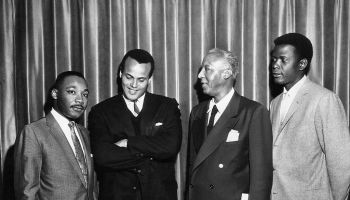We all love our Apple products, even if we hate our Apple products. But what about Apple’s practices? Can we love those? How are these products made? More importantly, who made these iPods, iPhones, iPads and other “magical” devices?
The answer is surprising if not chilling: 13-year-olds working upwards of 16 hours a day, that’s who, according to new reporting uncovered by PRI who did a story on Apple’s manufacturing in China last week.
Read the entire transcript of the show by clicking the link above!
STORY: Apple Halts iPhone Sales In China Due To Riots
PRI’s show, “This American Life,” did a program on the manufacturing of Apple products in China and referenced the work of, among others, Mike Daisey, a monolgosit whose parody of Steve Jobs is called The Agony & Ecstasy of Steve Jobs; and Nicholas Kristoff of the NY TImes. Here’s some of PRI’s findings.
The Chinese city of Shenzhen is where most of our “crap” is made. 30 years ago, Shenzhen was a little village on a river. Now it’s a city of 13 million people — bigger than New York. Foxconn, one of the companies that builds iPhones and iPads (and products for many other electronics companies), has a factory in Shenzhen that employs 430,000 people.There are 20 cafeterias at the Foxconn Shenzhen plant. They each serve 10,000 people.
One Foxconn worker Mike Daisey interviewed, outside factory gates manned by guards with guns, was a 13-year old girl. She polished the glass of thousands of new iPhones a day. The 13-year-old said Foxconn doesn’t really check ages. There are on-site inspections, from time to time, but Foxconn always knows when they’re happening. And before the inspectors arrive, Foxconn just replaces the young-looking workers with older ones. In the first two hours outside the factory gates, Daisey meets workers who say they are 14, 13, and 12 years old (along with plenty of older ones). Daisey estimates that about 5% of the workers he talked to were underage.
Daisey assumes that Apple, obsessed as it is with details, must know this. Or, if they don’t, it’s because they don’t want to know. Daisey visits other Shenzhen factories, posing as a potential customer. He discovers that most of the factory floors are vast rooms filled with 20,000-30,000 workers apiece. The rooms are quiet: There’s no machinery, and there’s no talking allowed. When labor costs so little, there’s no reason to build anything other than by hand.
A Chinese working “hour” is 60 minutes — unlike an American “hour,” which generally includes breaks for Facebook, the bathroom, a phone call, and some conversation. The official work day in China is 8 hours long, but the standard shift is 12 hours. Generally, these shifts extend to 14-16 hours, especially when there’s a hot new gadget to build. While Daisey is in Shenzhen, a Foxconn worker dies after working a 34-hour shift. Assembly lines can only move as fast as their slowest worker, so all the workers are watched (with cameras). Most people stand. The workers stay in dormitories. In a 12-by-12 cement cube of a room, Daisey counts 15 beds, stacked like drawers up to the ceiling. Normal-sized Americans would not fit in them. Unions are illegal in China. Anyone found trying to unionize is sent to prison.
Daisey interviews dozens of (former) workers who are secretly supporting a union. One group talked about using “hexane,” an iPhone screen cleaner. Hexane evaporates faster than other screen cleaners, which allows the production line to go faster. Hexane is also a neuro-toxin. The hands of the workers who tell him about it shake uncontrollably.Some workers can no longer work because their hands have been destroyed by doing the same thing hundreds of thousands of times over many years (mega-carpal-tunnel). This could have been avoided if the workers had merely shifted jobs. Once the workers’ hands no longer work, obviously, they’re canned.
One former worker had asked her company to pay her overtime, and when her company refused, she went to the labor board. The labor board put her on a black list that was circulated to every company in the area. The workers on the black list are branded “troublemakers” and companies won’t hire them. O
ne man got his hand crushed in a metal press at Foxconn. Foxconn did not give him medical attention. When the man’s hand healed, it no longer worked. So they fired him. (Fortunately, the man was able to get a new job, at a wood-working plant. The hours are much better there, he says — only 70 hours a week). The man, by the way, made the metal casings of iPads at Foxconn. Daisey showed him his iPad. The man had never seen one before. He held it and played with it. He said it was “magic.”
And this is how we get our “magical devices” from Apple. What’s ironic and sad is this: Chinese adults with wealth or disposable income are rioting to get their hands on these products.
Read more here.
SOURCE: Business Insider
















